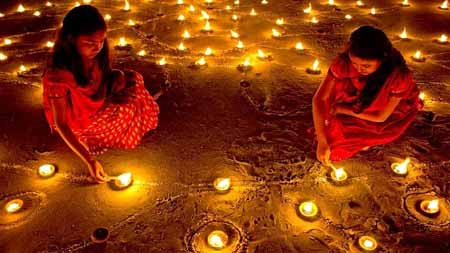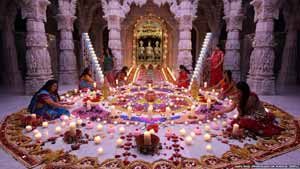Nearly a billion people worldwide participate in the Diwali celebration and almost a dozen countries officially recognize it as an official holiday. Dozens of cities across the United States, Canada, Australia, and the UK also have significant celebrations, dazzling both religious observers and casual passers-by. Despite the holiday’s increasingly global reach, many unfamiliar with the holiday are still unsure of its origins and significance.
Diwali’s cultural travel has allowed it to reach people from various national and linguistic backgrounds. As a result of Indian migration, people in nations as different as Singapore and Trinidad and Tobago celebrate the holiday. They observe its rituals, and share in its rich traditions.
So what does Diwali celebrate?
Meaning and Significance Behind The Diwali Celebration
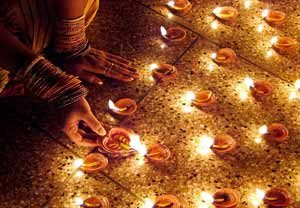 Diwali or “Deepavali” (Sanskrit), literally translated as “a series of lights”, is a religious holiday that spans three interrelated but distinct religions:
Diwali or “Deepavali” (Sanskrit), literally translated as “a series of lights”, is a religious holiday that spans three interrelated but distinct religions:
- Hinduism
- Jainism
- Sikhism
The festival holds particular significance for each group, but it more than anything signifies the triumph of good over evil as well as truth and knowledge.
It is deeply tied in with religious scripture and ancient legends.
Diwali Celebration: The Hindu Festival of Lights
For Hindus, the holiday of Diwali represents lessons and values to be kept throughout one’s life. Each value and lesson is celebrated on a particular day of the five-day holiday and it is learned through the struggles and triumphs of Gods and other important figures in the religion’s mythology.
A Celebration of Good Over Evil
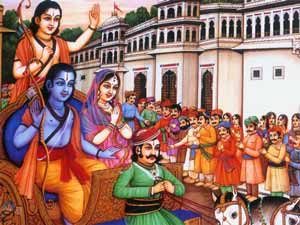
Lord Rama (Ram) and Sita
Each part of India has its own unique way of celebrating Diwali (as it is commonly known in Northern India) or Deepavali (the name more commonly used in the south). But everywhere in India, despite religious differences, Diwali is one of the most important holidays of the year.
Some differences in how the Diwali celebration is performed exist between the north and south. One in particular is associated with the first day of celebrations, when those in South India celebrate the victory of Lord Krishna over the demon Naraka – a day before celebrations in the North. Celebrations in Northern India begin with rituals associated with the return of Lord Rama (Ram) to Ayodhya after years of exile.
According to latter legend, Diwali celebrates Rama’s return from a 14-year exile imposed on him by his father. Upon his return, he finds his subjects distressed by the demon Ravana, a smart but evil ‘pundit,’ who terrorizes the Kingdom. In celebration of his return, Rama’s subjects welcome him back by lighting lamps, marking the holiday’s signature ritual. Rama, along with his wife Sita, defeats the demon and frees his Kingdom from oppression. Today, Lord Rama’s return and victory signifies the triumph of good over evil.
In addition, another popular ritual associated with Diwali in India is the puja (or prayer) dedicated to the Hindu Goddess of Wealth and Prosperity, Lakshmi. Diwali also commemorates the beginning of the New Year and is marked by the lighting of fireworks.
The Significance Behind The Five Days of Diwali Celebration
The First Day (Dhanteras) marks the beginning of the end of a 14 day dark period. On this day, the Lord Dhanvantari’s rises from the Ocean with Ayurvedic (medicine) for humankind. This day starts the festival of lights.
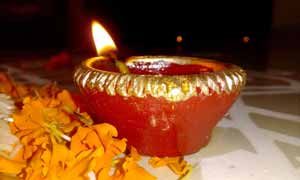
Lit Diya
The Second Day ( Narak Chaturdasi) celebrates Lord Krishna’s defeat of a demon named Narakasura. The demon asks Lord Krishna for forgiveness and Krishna grants it. This day has been dedicated to the belief that even the worst of us can change and deserve sympathy. It is also a celebrated as the day Lord Krishna freed the world from fear.
The Third Day (Lakshimi Puja) is the main celebration day of Diwali. On this day the Goddess Lakshmi emerged from the ocean bringing with her wealth and prosperity for the world. People responded by honoring and praising Lakshmi, and this practice continues to day.
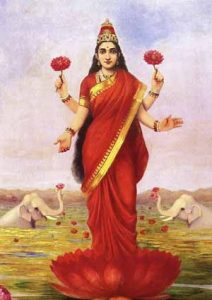
The Goddess Lakshmi
The Fourth Day (Padwa and Goverdhan Puja ) is a day for the prayer known as Goverdhan Puja (pooja) – a large offering of food. Some celebrate this day in honor of Lord Krishna’s protection of the villagers of Vrindavan from torrential rain caused by Indra (the god of rain and storms).
The Fifth Day (Bhai Duj) celebrates the love and affection between brothers and sisters. It reinstates the bother’s duty to protect and value his sister, and the sister’s reciprocated affection. On this day, a great feast is shared between brothers and sisters
How Are Each Of The Five Days Celebrated?
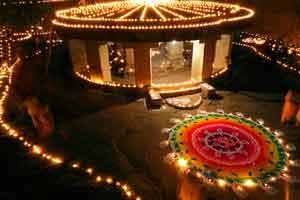
On the First Day people clean, renovate, and decorate their houses and businesses. Some will place a lighted or colorful Rangoli designs outside the door and small lights surround the house. Diyas (lamps) are lit and sweets offered as a sacrifice to the Goddess Lakshmi.
On the Second Day some celebrate by waking up before sunrise, bathing, and anointing themselves with oil. Firecrackers and fireworks are generally set off on this day.
The Third Day houses are alight with diyas in celebration of Lakshmi. Firecrackers and fireworks are set into the sky, and sparklers are lit (particularly popular with children). New clothes are worn, gifts and sweets are shared, and people generally partake in a feast.
On the Fourth Day sacrifices and offerings are made to deities.
On the Fifth and final day of Diwali, sisters share their meals with their bothers while the brothers share gifts with their sisters.
Diwali Celebration: Celebration Of The Attainment Of Nirvana By The Jains
For Jains, Diwali celebrations focus on Mahavira’s – the 24th Tirthankara (a spiritual teacher and leader) – attainment of Nirvana. The celebration also acts as an end of year marker.
Light also has important significance in the Jain celebration, as Gods present the night Mahavira reached Nirvana illuminated the surroundings which were otherwise dark due to a New Moon.
To honor the light brought by the Gods, Mahavira’s attainment of Nirvana, and the light of knowledge, Gana Kings and leaders from Kasi and Kosal lit lights the next evening.
To celebrate, Jains will offer Nirvana Ladoo (a special Indian sweet) and prayers to Lord Mahavira. Living and work spaces are decorated with diyas and other lights as in the Hindu tradition, and sweets are shared among friends and family. Some may choose to fast in honor of Mahavira.
Bandi Chhor Divas – The Sikh Day of Liberation
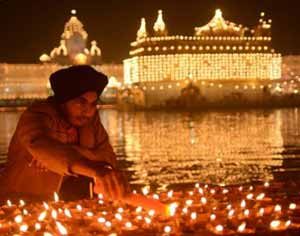
Diyas and lights are extremely symbolic in the Sikh celebration as well, as the Golden Temple was lit upon Guru Hargobind Ji’s return from prison. Today the tradition continues with the Golden Temple illuminated in remembrance, and gifts and meals shared between families.
Fireworks are also common, along with a street procession known as Nagar Keertan, music and singing at temples, and Akhand paath which is a non-stop reading of the works of the Guru Granth Sahib – an extremely important religious text.
To all those participating in Diwali Celebration, the team at Language Connections wishes you a Happy Diwali!
Sources:
- https://en.wikipedia.org/wiki/Diwali_(Jainism)
- http://www.sikhiwiki.org/index.php/Diwali
- http://www.bbc.co.uk/religion/religions/sikhism/holydays/diwali.shtml
- http://www.diwalifestival.org/five-days-of-diwali.html
- http://www.diwalifestival.org/
- http://festivals.iloveindia.com/diwali/diwali-customs.html
- https://www.legendsandmyths.net/diwali-celebration/
- https://en.wikipedia.org/wiki/Bandi_Chhor_Divas
- https://en.wikipedia.org/wiki/Guru_Granth_Sahib
- https://www.hindu-blog.com/2007/10/difference-between-diwali-in-north.html
About Language Connections:
Language Connections is one of the top language service companies in the US. Over the last 30 years, we’ve focused on providing the best business translation services, interpreting services, as well as interpreter training and customized language training programs. In addition to top-tier corporate language training, we offer certified corporate interpreters and professional business translation services in 200+ languages. Our network includes linguists with backgrounds in all major industries. They’re ready to meet your needs, whether they’re for technical translation services, legal translation, government translation services, international development translation services, education translation services, life sciences translation, or something else. Reach out to us today for a free quote on our cost-efficient and timely translation services, interpreters, or other linguistic services.
Language Connections LLC
2001 Beacon Street, Suite 105,
Boston, MA 02135
Phone: +1-617-731-3510
Email: service@languageconnections.com

